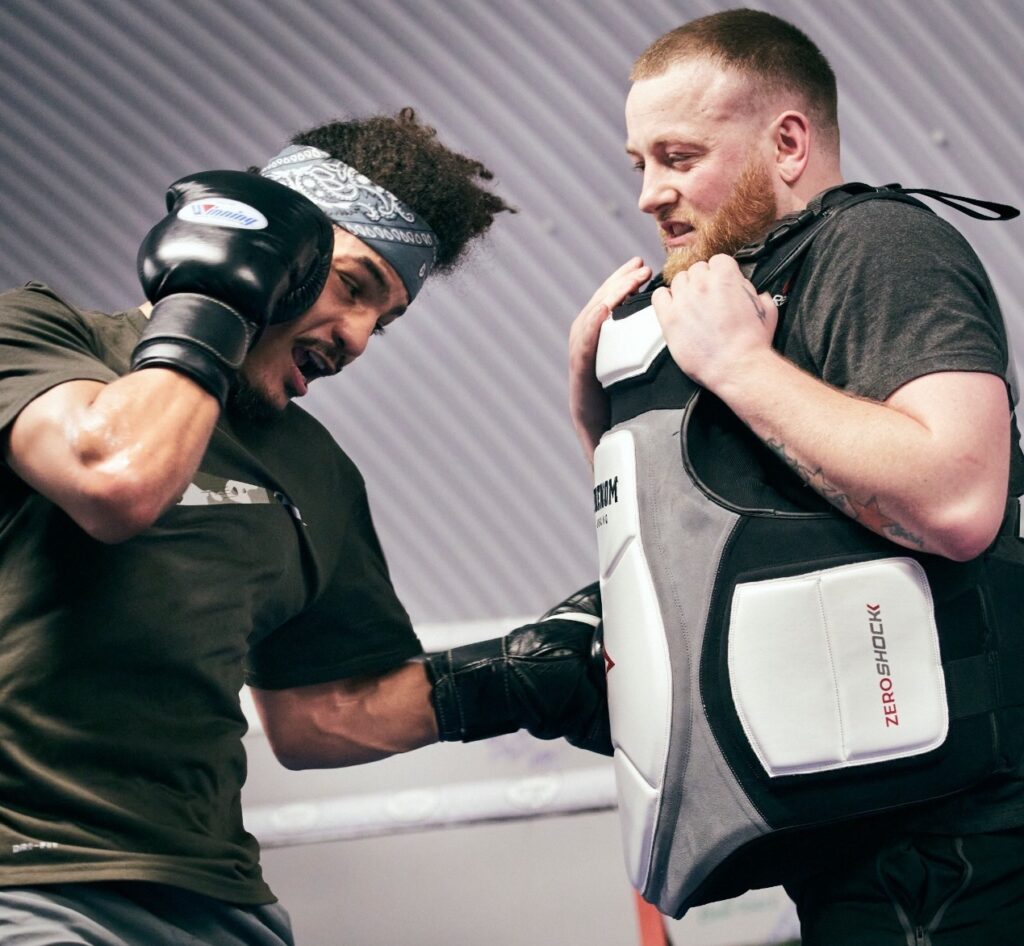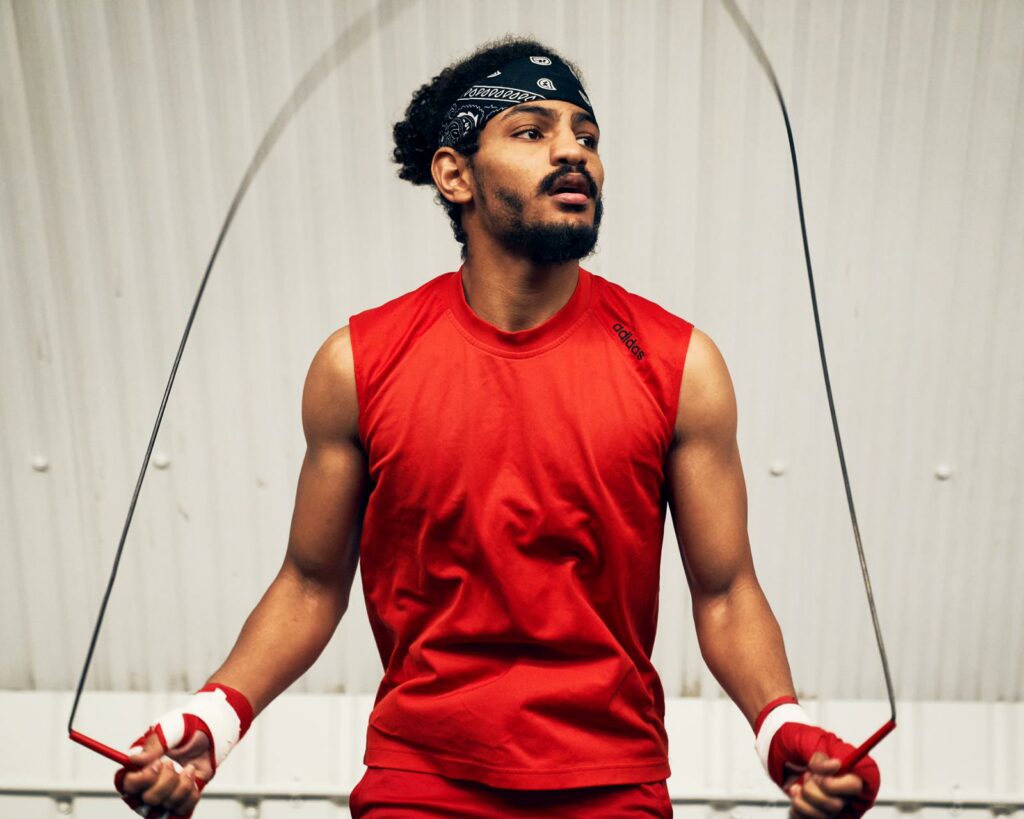It was around 7am on the morning of June 14, 2017, when I first read the headlines of Grenfell Tower, still burning, with fighters and friends of mine from the local area staring on in disbelief; painfully unable to make a difference. I had to get up and go to work with my phone flooded.
Just weeks prior, when the Tower unveiled the revamped, state-of-the-art Dale Youth amateur boxing gym, I’d been inside the facility, watching young men spending their aimless, dark winter nights acquiring skills as opposed to causing trouble. Mick Delaney and Gary McGuinness, two of the Dale’s selfless coaches, couldn’t help but smile from ear-to-ear, watching their life’s work come to fruition on the shiny, spotless first floor of the flawed tower block.
On June 14, that opportunity was cruelly taken away from them, though many suffered vastly more significant loss. It was only when speaking to newly-licensed professional, Ahmed Hatim, for Boxing Social, that we realised he’d probably have been one of those kids, staying disciplined and avoiding the whisper of the West London streets.
“I was involved in a lot of fights as a kid; I was challenged by a lot of people, so I was always having to defend myself. I thought one day, ‘Okay, let me go and try boxing. I’m sick and tired of this’. I wanted to be able to learn a discipline. I walked into Dale Youth, it was inside Grenfell Tower at that time, and Mick Delaney took me in. A couple of months after I’d started, the fire happened. I lost all contact with the trainers, so that was a big hurdle for me.
“As soon as I walked in, wow, it felt like home. It felt like that was where I belonged,” the 24-year-old explained. “I just felt starstruck. I’d be the first one in the gym and the last one out. I’d be so amazed; I’d be like, ‘This guy is good, but I want to be as good as him’. I’d watch Mick take people on the pads and I was just so intrigued. There’s no ego in there; there was nobody trying to prove themselves; it was hard work and dedication. I was just starstruck. I realised I could take boxing further that first time I took a break from it. I took a break from boxing, and it was like a week maybe, but I felt lost. I felt itching to get back to the gym.
“You find gold and it gets taken away from you. I thought, ‘Okay, I’ve found something here and this is what I wanna do’,” Hatim continued, wonderfully describing a young man’s affinity for controlled violence as “gold,” the upmost prize. And it was for the young West London-resident, because his journey from his childhood home to Dale Youth hadn’t started at Hammersmith Station; it had started way back in Sudan where he was born and (for a short time) raised. It was where the kids sounded different and had next-to-nothing.
“I came here to the UK when I was five or six. You could say that I grew up a little bit in Sudan, but most of my ‘growing’ growing, I’ve done here in London,” he said. “Growing up here, the road can swallow you whole if you’re not careful. I had good parents behind me, so I’ve always been looked after that way, but I’ve always been disciplined. I’ve always been taught to go after what you want and to not give up until you get it. It was tough. Obviously, Sudan, you know, it’s… survival of the fittest.”

Photo: Jim Fenwick.
Life in West London forced the promising amateur to remain fluid and become thick-skinned: “It was different at first. But just like I said, I’ve always been taught to adapt – always. Obviously, the language barrier at the beginning was tough. I was getting into a lot of fights and stuff because people were testing me; people were bullying me.
“At the beginning, there was a lot of proving myself, as you do when you’re kids. People were always using me as a steppingstone for their own friends, so I got into a lot of trouble back then when I was younger. I’d be fighting every week and they’d be calling my parents. It’s a cruel word when you’re that age and I’m not the kind of guy to take that, but you gotta sink or swim, to be honest. When that bell rings now, I’m a completely different person – and I don’t just say that. That aggression comes from a lot of doubt. It comes from people who’ve been doubting me my whole life and telling me: ‘You can’t do it’. I had teachers telling me – in front of everyone – that I wouldn’t do anything [with my life]. They’d make fun of me, literally in front of everyone. It comes from a dark place where people don’t ever give me a chance.”
Hatim, initially campaigning at 140lbs, is preparing for a professional debut after signing his first professional contract with the reputable Streetwise Management, headed up by Michael Amoo-Bediako, credited for the rise of Ghanaian former IBF lightweight world champion, Richard Commey. Amoo-Bediako has been building his stable of late, with the signing of Joshua ‘Seunzy’ Wahab and heavyweight Michael Pirotton-Bamogo, but whilst those deals involved scouting and word of mouth, Hatim’s unravelled a little differently.
“I met Michael through my neighbour Jim, he’s a friend of his. He always used to see me going to the gym with my bag and he’d ask: ‘How are you doing today? Going to training?’ So, he asked if I boxed and I was like, ‘Yeah, I do’. He arranged a sit down with Michael and introduced me to him. We just clicked to be honest. It felt right. When I done my research, he’s someone who took Richard Commey from nothing to becoming world champion, so clearly, he knows what he’s doing. We decided to embark on this journey together. I look a man right in his eyes and I’ll ask him straight, direct questions… I want to treat people the same way I want to be treated, and I got that same response from Michael. The rest is history.”

Richard Commey with new hope Hatim. Photo: Jim Fenwick.
Hatim’s short-term goals include Southern Area titles and competitive fights that people can talk about stumbling home from the balcony of Bethnal Green’s iconic York Hall. Longer term? The lofty ambitions of world titles, of course. But not just for himself; for the people of Sudan, without a reputable amateur boxing squad (something Hatim is hoping to change, by building on the foundations of the country’s existing amateur set-up), and for those who lost their lives in Grenfell Tower, the venue that hosted his introduction to “gold”.
After finishing our call and in preparing this interview for Boxing Social, I rewatched the footage I’d taken that day in Dale Youth, Grenfell Tower, hoping to catch a glimpse of a young, focused Ahmed Hatim swinging wild shots at a newly-purchased heavy bag or sparring one of his peers on the beautifully ironed canvas. He could have been in one of their two rings that day, with barely a facial expression visible from beneath the protective head gear.
It doesn’t matter. That’s where boxing intervened and where his exciting journey began and, like the gym itself, Hatim is ready to rise. “I’ve went back to Sudan over the last couple of years and I’ve seen people in a very, very bad situation. I wanna be the first Sudanese world champion, so that I can give back to the people of Sudan. I use boxing and what comes with it to really inspire others. I want to change peoples’ lives and my own as well.”

Photo: Jim Fenwick.
Main image and all photos: Jim Fenwick.
